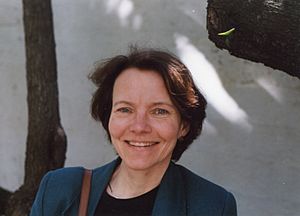Jenny Harrison facts for kids
Quick facts for kids
Jenny Harrison
|
|
|---|---|
 |
|
| Born |
Atlanta, Georgia, US
|
| Education | University of Alabama (BA) University of Warwick (PhD) |
| Known for | Contributions to geometric analysis, chainlets |
| Scientific career | |
| Fields | Mathematics |
| Institutions | University of California, Berkeley |
| Doctoral advisor | Christopher Zeeman |
Jenny Harrison is a brilliant professor of mathematics at the University of California, Berkeley. She is known for her important work in a field called geometric analysis. This area of math helps us understand shapes and spaces.
Early Life and Schooling
Jenny Harrison grew up in Tuscaloosa, Alabama. She earned her first degree from the University of Alabama. She then received a special scholarship called a Marshall Scholarship. This allowed her to study further at the University of Warwick in England.
While at Warwick, Jenny made a big discovery in mathematics. She found an example that challenged an idea by another mathematician, Arnaud Denjoy. This important work was published in a famous math journal in 1975. She finished her PhD that same year. Her main teacher was Christopher Zeeman.
After her PhD, Jenny worked with Hassler Whitney at the Institute for Advanced Study. She also became a Miller Research Fellow at Berkeley. From 1978 to 1981, she taught at the University of Oxford in England. Then, she returned to Berkeley to teach there.
In 1986, there was a disagreement about her job status at Berkeley. This led to a review of her research by a group of seven independent mathematicians and scientists. They all agreed that her work was excellent. Because of their recommendation, she was promoted to a full professor.
Amazing Math Discoveries
Professor Harrison is an expert in geometric analysis. She also works in areas where algebra, geometry, and geometric measure theory meet. She helped create a new way to understand math called differential chains.
This new theory helps connect very small calculations with the classic ideas of smooth, continuous shapes. It can be used for many different things. For example, it helps understand soap films, fractals, and even charged particles. It treats these complex shapes in the same way as smooth shapes. This work has made important math rules, like those by Stokes, Gauss, and Green, much simpler and more general.
Professor Harrison has also found ways to use differential chains in physics and how things move. She solved a very old math problem called Plateau's problem. This problem is about finding the shape of a soap film stretched across a wire frame. Her solution was the first to include all kinds of soap films found in nature. This includes films that are not flat or have special meeting points.
Jenny Harrison first learned about Plateau's problem when she was a student. Later, she found a counterexample to another math idea called the Seifert conjecture. In 1983, she suggested that a general theory could link these ideas. This was the start of the theory of differential chains. Jenny Harrison and Harrison Pugh later proved that differential chains have a special property. They used this theory to give the first complete solution to Plateau's problem. This included understanding how soap films become smooth.
Awards and Honors
Professor Harrison has received many awards and fellowships for her important work:
- Foundational Questions Institute, research award, 2009
- Miller Institute for Basic Research in Science, Miller Professor, 2007
- Rockefeller University, Visiting Research Professor, 1996–97
- Yale University, National Science Foundation, Visiting Scholar, 1989–90
- Oxford University, CUF Lecturer and Tutorial Fellow, Somerville College, 1978–81
- Miller Institute for Basic Research in Science, Miller Fellow, 1977–78
- Institute for Advanced Study, Visiting Fellow, Princeton, 1975–76
See also
 In Spanish: Jenny Harrison para niños
In Spanish: Jenny Harrison para niños
 | Bessie Coleman |
 | Spann Watson |
 | Jill E. Brown |
 | Sherman W. White |

